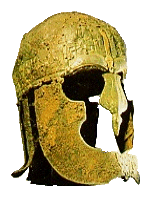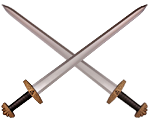Commentary
 |
The Battle of Maldon deserves its place not only in the annals of English Literature, but also in our country's history. It records an instance of astonishing heroism comparable to such celebrated events as the Charge of the Light Brigade, the Siege of Lucknow, or in the Zulu War, the Battle of Rorke's Drift. |
For what happened in Maldon was a triumph of a peculiarly British character; the poem celebrates not victory, but failure - failure so heroic that the losers are remembered long after the victors are forgotten. The beginning of the poem sets the mood of the whole: Brithnoth has summoned his forces together to stand against the invasion, and the first order he gives is for the men to drive away their horses, thus effectively making retreat impossible. There is to be no flight from here: the thanes can only stand or die. And so (for the most part) they do.
Brithnoth himself is almost a caricature of British heroism: a man who snatched defeat from the jaws of victory by playing the game of war as if it were cricket. His permitting the Norsemen to cross the causeway is comparable to opening the castle gates to admit the enemy. But with what glorious enthusiasm he does it! - 'come swiftly to us, warriors to war.' The keynote throughout is impatience: on both sides, the men are chafing for battle. The worst thing the poet can say about the cowards who steal the remaining war-horses and fly the field is that 'they loved not the battle'.
With the fall of Brithnoth, the Battle of Maldon is lost. But this is the point at which folly transcends failure, and becomes heroism on the grand scale. After the flight of the despicable Godric panics some of the lesser men into retreat, the remaining men of Essex make a stand about the body of their fallen lord, fighting to the last, to avenge their chieftain. And there they die - all of them.
To have an ancestor who survived the Battle of Maldon was a source of lasting shame. But those who died there are still held in high honour, and it is in celebration of their name that this poem was written.
'The Battle of Maldon' was composed in the oral tradition of Old English alliterative verse, a form in which as many lines as possible were to be marked by two, or ideally three, stressed soundings of the same consonant. One of the most remarkable features of the following translation is that Wilfrid Berridge has aimed to produce the same effect in modern English.
For example:
|
His friend in the fight - then gan he forth to bear The spear to the strife - high spirit had he. |
In fact, the number of lines characterised in this way is comparable to the success rate of the original (anonymous) poet - which, given the additional restrictions of translation, is a very considerable achievement.
A.L.B. 1991

